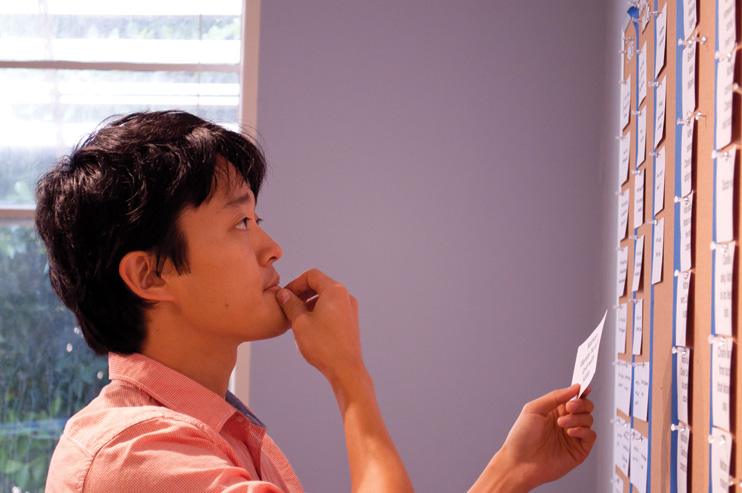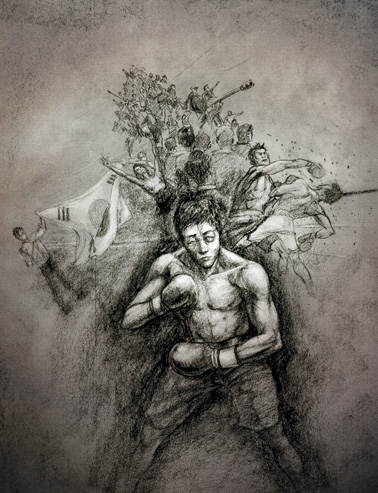Serious About His Funny
story by GRACE SUH
photographs by INKI CHO
At 32, the slight, bespectacled, very boyish-looking Daniel Chun has an IMDB page that would be impressive for a TV writer of any age: six years on The Simpsons, where he advanced from writer to co-executive producer, and then, starting in 2009, three years on The Office, where he rose to the same position and even took a turn as director.
Pretty cool for a guy who ran tests on monkeys as a biological anthropology student. Of course, it doesn’t hurt that college was Harvard, where he wrote for the famed Lampoon all four years and made friends with other comedy writers, including BJ Novak, who soon thereafter nabbed a role in The Office. After graduation Chun rode the well-greased pneumatic tube that runs between The Lampoon castle andThe Simpsons writers’ room, landing an agent and The Simpsons job via Scrubs and Will & Grace spec scripts.
But that was just the beginning. Things are really blowing up for Chun these days. Following in the path of his good friend Mindy Kaling, former Office star and fellow Office writer, Chun signed a seven-figure development deal this past summer with ABC, in what the network describes as “a real coup” for the studio. He currently works as a consultant on the ABC show Happy Endings and recently got the green light for two of his own sitcom projects—an ensemble friends comedy for Fox and a comedy centered around a Korean immigrant family restaurant for ABC. In addition, he’s almost done with an action adventure feature screenplay built around The Guinness Book of World Records for Warner Bros.
This sort of success doesn’t happen by accident. Despite the irreverent humor that is his calling card and the slyly silly, scatological tone of his popular Twitter feed, in our conversation, Chun comes off as remarkably thoughtful, responsible and hard-working. You can see how it’s a winning combination for those who hire him: lots of talent (accompanied by the archetypal comedy traits, anxious and socially challenged), motored by keenly pragmatic career savvy.
When a Twitter follower frets about having trouble with time management, Chun recommends the bookGetting Things Done (“changed my life”). Congratulated on the ABC and Fox deals, he’s quick to point out that these are just for pilots: “Then we have to see if anything gets picked up; there’s no telling.” Asked about his career goals, he says: “I just want to make sure my peak creative years are being milked as much as possible. I want to always have an iron in each fire, that’s the best way to do it.” In other words, when it comes to comedy, Chun is very serious.
Congrats again on the Fox/ABC deals. What can you tell me about these projects?
No Worries is the working title for the one for Fox. It’s about two brothers at different points in their lives and about settling down. It’ll be an ensemble comedy, like Friends or Happy Endings, but the characters are a little older, going into their 30s, and also these aren’t characters who have known each other all their lives. It’s about entering into a group of friends and how that changes the dynamic.
The other doesn’t have a title yet, but it’s a family-based project for ABC, with a Korean mom and half-Korean kids with different immigrant statuses that inform their personalities. The mom grew up in Korea, and one older sibling was born in Korea, but grew up here, while the younger one is all-American. And they have a restaurant.
So do these projects have any autobiographical aspects?
The friends one is kind of where I am at the moment. I moved out to L.A. and started working right away, and my peers were older, so I was inspired by that. And now I’m 32, and part of what I’m trying to say is that there are different definitions of what it means to be 32 — it means very different things to different people. When you’re kind of introverted or have an awkward childhood, you can be either very eager to get out of that phase of life, or you can spend the rest of your life trying to get it right. I wanted to move on from feeling young. I was ready to be an adult. So this is a good age for me.
So what does 32 mean to you?
The same thing it meant when I was a kid. When my parents were 32, they were married and had kids and owned a house. They didn’t go out every weekend. I still feel like that definition.
And that’s where you are, right? I read you recently got married.
Yes, we met at a party. She’s an architect. Living in Hollywood, being in the business, there are definitely surreal moments, but we both came from pretty traditional families and small towns, and we’ re more comfort- able having some semblance of that life we grew up with. We like going to crazy parties, but it feels trippy that we’re there. Lately we’ve been the couple that shows up early and leaves really early.
As for the restaurant show, we didn’t have a restaurant growing up or anything. My dad is a doctor, a pediatrician, and my mom was the bookkeeper for the medical practice, so I’ll have to do a littleresearch. But it’s not a show about restaurants; it’s a show about people, and the characters are based on people my own age, my younger brother’s age and my mom’s age, although with a lot more in the Korean network to fall back on. But my younger brother is a lot younger, by 10 years, and he’s had a very different Asian American experience than I’ve had.
You mention an “awkward childhood.” What was that like?
Oh, nothing extraordinary, just being a Korean kid in a small town that didn’t have a lot of Asians. I grew up in a small town 40 minutes outside of Scranton, Pa. So the thing I enjoyed the most out of comedy was that I was good at it. Because that helped me socially.
What TV did you watch as a child?
Age-appropriate stuff. I liked TGIF and Disney as a kid, and in high school I was really into SNL andKids in the Hall. I didn’t actually watch a lot of sitcoms. Nowadays we watch Louie, Workaholics, Game of Thrones, Breaking Bad, Homeland.
You’re young, but how is the presence and representation of Korean Americans and Asian Americans in the larger culture different from when you were growing up?
I think it’s definitely changed culturally, but it’s hard for me to gauge the change because I’ve moved to progressively more diverse areas of the country as I’ve aged. But certainly it’s less of a deal. Especially since the 1980s to now, there’s been a massive shift in the extent to which being Asian is something that people have to comment on or find to be an exotic thing.
Does Hollywood feel post-racial?
No, but it’s transitioning. A lot of people like me who grew up and were born in America are very integrated, a lot of us have entered in and are creating content, and the roles will start coming. Like Mindy [Kaling]. She’s Indian, but the show (The Mindy Project) isn’t about being Indian. That reflects what’ s happened in our culture where my generation and the ones born after us, like my younger brother, are less defined by our ethnic identities. There’s been more space and appetite in the culture for true authenticity and nuance. I’m not sure what’s behind that, if the culture has changed or the TV industry has changed. There are more channels now for more specific world views and demographics.
What do you think about the anti-Asian racism that still occasionally flares up in the middle of mainstream culture, things that other people don’t even seem to notice?
What offends me tends to be stuff that’s stereotype and just not funny. Usually there’ s a correlation between something that feels real and something that’s funny. When a character’s a real racial stereotype, it’s both not funny and offensive to me because it’s ignorant interpretation and not based in reality. I feel like if you just are trying to do something really good in comedy, you’re portraying them more accurately and give them more depth and give them interesting things to do. Stereotypes are unoriginal. When you’re writing comedy, you’re mandated to be original, so you can’t really do stereotypes.
What’s been most rewarding for you in all of your success in Hollywood?
It’s not the parties or awards and all that. But going on Twitter after an episode has aired and seeing people from all around the country quoting a line that you wrote is pretty incredible. And the day-to-day experience of being able to use your full brain and be surrounded by incredibly talented, creative people — that’s the most amazing part. All the Hollywood stuff is kind of a novelty, but you pretty quickly realize that it’s no different. The actual experience of being a professionally paid writer is what’s rewarding.
BEST DANIEL CHUN TV
THE OFFICE
* “Training Day” – Deangelo (Will Ferrell) comes in to replace Michael Scott as manager, and everyone strives to impress the new boss (Kevin even wears his toupee).
* “The Delivery: Part I” – Pam goes into labor, but refuses to go to the hospital, and Dwight remodels Pam and Jim’s kitchen without their permission.
* “Murder” – To distract from news of Dunder Mifflin’s impending insolvency, Michael makes everyone play the murder mystery game Belles, Bourbon and Bullets.
THE SIMPSONS
* “Any Given Sundance” – Lisa’s documentary (Capturing the Simpsons) shows the family in all its dysfunction and screens at Sundance to great acclaim.
* “Rome-old and Juli-eh” – Grampa Simpson and Marge’s sister Selma fall in love and get married, while Homer files for bankruptcy after a pricey rec room renovation.
This article was published in the November 2012 issue of KoreAm. Subscribe today! To purchase a single issue copy of the November issue, click the “Buy Now” button below. (U.S. customers only.)













